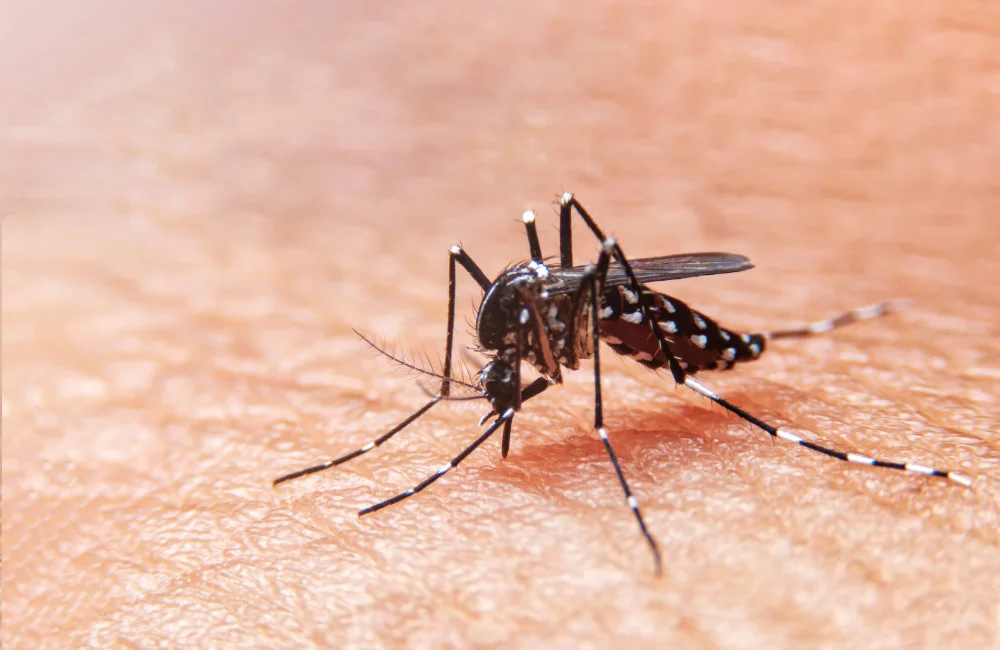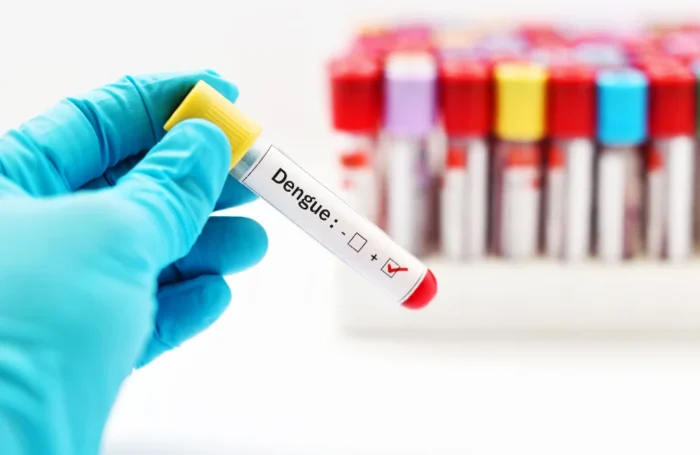Living in or visiting Phuket comes with its unique health considerations, and dengue fever stands as one of the most significant concerns for both residents and travelers. With Thailand’s warm, humid climate creating ideal conditions for mosquito breeding, understanding dengue Phuket becomes crucial for maintaining your health and well-being. Regular health checkups and awareness of this mosquito-borne illness can help you stay protected while enjoying your vacation.
What is Dengue Fever Phuket?
Dengue fever Phuket is a significant public health concern in this tropical region, characterized as a viral infection transmitted through the bites of infected Aedes mosquitoes. This mosquito-borne illness affects thousands of individuals annually in Phuket, with symptoms ranging from mild fever and headaches to severe complications that can be life-threatening.
What Causes Dengue Fever Phuket?
- Dengue Virus Infection – The primary cause is infection with any of the four dengue virus strains (DENV-1, DENV-2, DENV-3, DENV-4) that circulate in Phuket’s tropical environment
- Aedes Mosquito Transmission – Female Aedes aegypti and Aedes albopictus mosquitoes serve as the primary vectors, becoming infected when they feed on dengue-infected individuals
- Environmental Factors – Phuket’s warm, humid climate and abundant rainfall create optimal breeding conditions for Aedes mosquitoes throughout the year
- Urban Development – Rapid urbanization and construction activities in Phuket create numerous water collection sites where mosquitoes can breed effectively
- Seasonal Patterns – The rainy season from May to October significantly increases mosquito populations and dengue transmission rates in Phuket
Why Does Dengue Fever Commonly Happen in Phuket?
Phuket dengue fever occurs frequently due to the island’s unique geographical and climatic characteristics that create perfect conditions for mosquito breeding and virus transmission. The tropical climate maintains consistently warm temperatures and high humidity levels year-round, while the monsoon season provides abundant standing water in containers, construction sites, and natural depressions. The island’s dense population, combined with millions of annual tourists, creates an ideal environment for rapid virus spread among susceptible individuals.
What Is Phuket Dengue Fever Transmission Cycle?
The Phuket dengue fever transmission cycle begins when a female Aedes mosquito bites an infected person during their viremic period, typically the first few days of illness when the virus circulates in the bloodstream. The virus then multiplies within the mosquito over 8-12 days, eventually reaching the salivary glands where it remains for the mosquito’s lifetime. When this infected mosquito subsequently bites a healthy individual, the dengue virus enters their bloodstream and begins replicating throughout their body, particularly targeting immune system cells. This newly infected person then becomes capable of transmitting the virus to other mosquitoes that bite them, continuing the cycle and contributing to dengue Phuket‘s persistent presence in the community.
Dengue Phuket: Risk Factors
- Living in or frequently visiting areas with high Aedes mosquito populations
- Being in close contact with dengue-infected individuals in household or community settings
- Spending time outdoors during peak mosquito activity hours (early morning and late afternoon)
- Residing near construction sites, abandoned buildings, or areas with poor drainage
- Having a history of previous dengue infection, which increases risk of severe complications
- Living in overcrowded urban areas with inadequate water storage and waste management
- Having compromised immune systems due to age, illness, or medical treatments
- Working in occupations that require outdoor activities or travel to endemic areas
Symptoms of Dengue Fever
Dengue fever Phuket typically manifests through three distinct phases, each presenting unique symptoms that help healthcare providers assess disease severity and provide appropriate treatment.
Febrile Phase
The febrile phase marks the onset of Phuket dengue fever with sudden high fever reaching 39-40°C, accompanied by severe headaches and intense pain behind the eyes. Patients experience significant muscle and joint pain, often described as “breakbone fever,” along with nausea, vomiting, and loss of appetite that can last 2-7 days.
Critical Phase
The critical phase occurs when fever subsides but patients remain weak and fatigued, with potential plasma leakage leading to shock and dangerous complications. Easy bleeding manifests as nosebleeds, gum bleeding, or vomiting blood, while blood pressure drops significantly, creating life-threatening situations without prompt treatment.
Recovery Phase
The recovery phase signals the body’s return to balance as symptoms gradually improve and patients begin feeling better within 48-72 hours. Increased urination indicates fluid recovery, marking the transition toward complete healing and restoration of normal bodily functions and energy levels.
How to Treat Phuket Dengue Fever
Currently, no specific antiviral treatment exists for dengue fever Phuket, making supportive care and symptom management the primary therapeutic approaches. Treatment focuses on maintaining proper hydration, controlling fever, monitoring for complications, and providing appropriate medical intervention when warning signs appear. Early recognition of symptoms and prompt medical attention significantly improve patient outcomes and reduce the risk of severe complications associated with dengue Phuket.
1. Fever Reduction
Managing fever in Phuket dengue fever requires careful medication selection, with paracetamol (acetaminophen) being the recommended antipyretic due to its safety profile. Aspirin and ibuprofen should be strictly avoided as they increase bleeding risk, a serious concern in dengue patients. Physical cooling methods like tepid sponging and maintaining a cool environment also help reduce fever effectively.
2. Rest
Adequate rest is essential for dengue fever Phuket recovery, allowing the immune system to fight the viral infection effectively while conserving energy for healing. Patients should avoid strenuous physical activities and maintain bed rest during the acute phase to prevent complications. Creating a comfortable, quiet environment promotes better sleep quality and supports the body’s natural recovery processes.
3. Medical Attention (Severe Case)
Severe Phuket dengue fever cases require immediate hospitalization for intensive monitoring and advanced supportive care. Treatment may include:
- Intravenous fluid replacement to maintain blood pressure and prevent shock
- Platelet transfusions for patients with dangerously low platelet counts
- Continuous monitoring of vital signs, blood pressure, and urine output
- Laboratory monitoring of hematocrit levels, platelet counts, and liver function
- Immediate intervention for signs of plasma leakage or hemorrhagic complications
- Intensive care unit admission for patients with dengue shock syndrome
Is Phuket Dengue Dangerous?
Phuket dengue can indeed be dangerous, particularly when it progresses to severe forms like dengue hemorrhagic fever or dengue shock syndrome, which can be life-threatening without proper medical intervention. The risk increases significantly with secondary infections, as subsequent dengue infections often result in more severe symptoms and complications than the initial occurrence.
How to Prevent Dengue Phuket
-
- Eliminate mosquito breeding sites by regularly emptying, cleaning, and covering water storage containers, flower vases, and any items that can collect rainwater around your property.
- Use effective mosquito repellents containing DEET, picaridin, or oil of lemon eucalyptus on exposed skin, especially during peak mosquito activity hours in early morning and late afternoon.
- Wear protective clothing including long-sleeved shirts, long pants, and closed shoes when outdoors, particularly in areas known for high mosquito populations.
- Install physical barriers such as window screens, door nets, and bed nets to prevent mosquitoes from entering living spaces and bedrooms.
- Maintain proper sanitation by ensuring good drainage around your property, disposing of waste properly, and keeping surroundings clean and dry.
- Consider dengue vaccination after consulting with healthcare providers, especially if you have a history of previous dengue infection or live in high-risk areas.
- Stay informed about dengue Phuket outbreaks and follow public health recommendations during peak transmission seasons.
- Getting vaccinated can help prevent dengue virus strains.
What Is the Dengue Vaccine?
The dengue vaccine represents a significant advancement in preventing dengue fever Phuket, designed to provide protection against all four dengue virus strains circulating in the region. These vaccines work by stimulating the immune system to recognize and fight dengue viruses, reducing both the likelihood of infection and the severity of symptoms if infection occurs. Currently, two main dengue vaccines have received approval for use in various countries, each with specific indications and administration schedules tailored to different population groups and risk factors.
Why Should You Get the Phuket Dengue Vaccine?
Getting vaccinated against dengue fever Phuket offers crucial protection for residents and frequent visitors to this endemic region, significantly reducing the risk of severe illness and hospitalization. The vaccine is particularly beneficial for individuals with previous dengue infections, as it helps prevent the more dangerous secondary infections that can lead to life-threatening complications.
Types of Dengue Vaccine
Two primary dengue vaccines are currently available, each developed with distinct characteristics and applications for different population groups.
1. Dengvaxia (CYD-TDV)
Dengvaxia, manufactured by Sanofi Pasteur, is a live-attenuated tetravalent vaccine specifically recommended for individuals with laboratory-confirmed previous dengue infection. This vaccine requires three doses administered at 6-month intervals and has demonstrated up to 80% efficacy in reducing dengue illness among seropositive individuals. However, it is not recommended for seronegative individuals due to increased risk of severe dengue upon subsequent natural infection, making pre-vaccination screening essential for safe administration.
2. Qdenga (TAK-003)
Qdenga, developed by Takeda Pharmaceuticals, offers broader application as it can be administered to both seropositive and seronegative individuals within approved age ranges. This live-attenuated tetravalent vaccine requires only two doses given three months apart, making it more convenient for patients. Clinical trials have shown approximately 80% efficacy in preventing dengue illness and up to 90% effectiveness in reducing hospitalization rates, making it a valuable tool for dengue Phuket prevention strategies.
Benefits of the Dengue Vaccine
- Reduces infection risk by stimulating immune system protection against all four dengue virus strains commonly found in Phuket
- Decreases symptom severity significantly, even if breakthrough infections occur after vaccination
- Prevents hospitalizations by reducing the likelihood of developing severe dengue complications requiring intensive medical care
- Protects against secondary infections which are typically more dangerous than primary dengue infections
- Contributes to community protection by reducing overall virus transmission rates in endemic areas like Phuket
- Provides long-term immunity with protection lasting several years after completing the vaccination series
- Reduces healthcare costs associated with dengue treatment and hospitalization expenses
Who Should Get the Dengue Vaccine?
- Individuals with confirmed previous dengue infection who face higher risks of severe complications from subsequent infections
- Residents of dengue-endemic areas like Phuket who have ongoing exposure to infected mosquitoes throughout the year
- Frequent travelers to tropical regions with high dengue transmission rates, particularly those staying for extended periods
- Healthcare workers and laboratory personnel who may have occupational exposure to dengue virus or infected patients
- Children and adolescents within approved age ranges living in high-risk areas with documented dengue circulation
- Individuals with specific medical conditions that may increase their risk of severe dengue complications
- People living in areas with recent dengue outbreaks or consistently high transmission rates
Precautions Before Getting the Dengue Vaccine
- Consult healthcare providers to assess individual risk factors, medical history, and determine the most appropriate vaccine type
- Undergo dengue serology testing if recommended to determine previous infection status before Dengvaxia administration
- Disclose all current medications and medical conditions that might affect vaccine safety or efficacy
- Avoid vaccination during illness or fever, postponing immunization until complete recovery from acute conditions
- Inform providers about allergies to vaccine components or previous adverse reactions to any vaccines
- Consider pregnancy status as dengue vaccines are generally not recommended during pregnancy or breastfeeding
- Plan vaccination timing to ensure completion of the full vaccine series according to recommended schedules
Dengue Vaccine’s Side Effects
- Injection site reactions including pain, redness, swelling, and tenderness at the vaccination site lasting 1-3 days
- Mild systemic symptoms such as low-grade fever, headache, and general malaise typically resolving within 48-72 hours
- Muscle and joint pain similar to mild flu-like symptoms that usually subside without specific treatment
- Fatigue and weakness that may persist for several days following vaccination but gradually improves with rest
- Rare allergic reactions including rash, itching, or more serious hypersensitivity reactions requiring immediate medical attention
- Gastrointestinal symptoms like nausea or mild stomach upset occurring infrequently after vaccination
- Temporary lymph node enlargement near the injection site as part of normal immune system response
Our Dengue Fever Screening and Treatment Services
At Phuket Medical Clinic, we provide comprehensive dengue fever Phuket screening and treatment services using advanced diagnostic technology for accurate, timely results. Our experienced medical team specializes in dengue management, offering both rapid testing and detailed laboratory analysis to ensure proper diagnosis and monitoring throughout treatment.
Types of Dengue Fever Tests
Accurate diagnosis of dengue fever Phuket requires sophisticated laboratory testing to confirm infection, determine disease stage, and monitor patient progress throughout treatment. Our clinic utilizes multiple testing methodologies to provide comprehensive diagnostic information, enabling healthcare providers to make informed treatment decisions and identify potential complications early.
1. NS1 Antigen Rapid Test
The NS1 antigen rapid test provides quick detection of dengue virus protein from the first day of symptom onset, making it invaluable for early diagnosis of Phuket dengue fever. This test identifies the non-structural protein 1 (NS1) that the dengue virus produces during replication, offering results within 15-20 minutes. The NS1 test is particularly useful during the acute phase when viral levels are highest, providing healthcare providers with immediate diagnostic information to guide patient management and treatment decisions.
2. Polymerase Chain Reaction (PCR) Test
The PCR test represents the gold standard for dengue virus detection, directly identifying viral genetic material with exceptional accuracy and sensitivity. This molecular diagnostic technique can distinguish between different dengue virus serotypes, providing crucial information about the specific strain causing infection. PCR testing is especially valuable during the early stages of Phuket dengue fever when viral loads are sufficient for detection, offering definitive diagnosis that guides appropriate treatment protocols.
3. IgM and IgG Antibody Test
IgM and IgG antibody testing evaluates the immune system’s response to dengue infection, helping determine whether the patient has a current acute infection or previous dengue exposure. IgM antibodies appear early during infection and indicate recent or ongoing dengue fever Phuket, while IgG antibodies suggest past infection or later stages of current illness. This testing is crucial for vaccination decisions, as some vaccines require confirmation of previous dengue infection for safe administration.
4. Complete Blood Count (CBC)
The Complete Blood Count provides essential information about blood cell levels, particularly monitoring platelet counts, white blood cells, and hematocrit values critical for dengue fever Phuket management. This test helps healthcare providers assess bleeding risk, detect plasma leakage, and monitor disease progression throughout treatment. Regular CBC monitoring enables early detection of complications like thrombocytopenia or hemoconcentration, allowing for timely intervention and appropriate supportive care.
Why Choose Phuket Medical Clinic?
Phuket Medical Clinic is your trusted partner for comprehensive dengue fever prevention, diagnosis, and treatment, combining experienced medical professionals with modern diagnostic technology to deliver exceptional healthcare services. Our multilingual team understands the unique needs of both local residents and international visitors, providing culturally sensitive care in a comfortable, professional environment. We offer complete Phuket vaccine services, including dengue vaccination counseling and administration by qualified healthcare providers who stay current with the latest immunization guidelines. When you need reliable dengue fever Phuket services, from rapid testing to treatment monitoring, our clinic provides the expertise and technology necessary for optimal health outcomes.
Contact us today to schedule your dengue screening, discuss vaccination options, or learn more about our comprehensive preventive health services designed to keep you and your family protected in Phuket.



